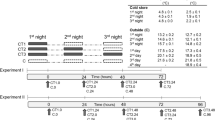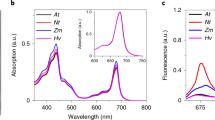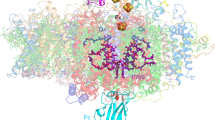Abstract
THE phenolase complex in green plant tissue has often been assumed to be present only in the chloroplasts1; but it has recently been shown that in sugar beet leaf phenolase is also present in the mitochondria and ‘Soluble’ fraction of homogenates. The enzyme associated with chloroplasts was shown to be characterized by a high cresolase activity, the ratio of catecholase to cresolase activities being close to unity. Disruption of such chloroplasts with distilled water increases both activities by 35 per cent2.
This is a preview of subscription content, access via your institution
Access options
Subscribe to this journal
Receive 51 print issues and online access
$199.00 per year
only $3.90 per issue
Buy this article
- Purchase on Springer Link
- Instant access to full article PDF
Prices may be subject to local taxes which are calculated during checkout
Similar content being viewed by others
References
Arnon, D. I., Plant Physiol., 24, 1 (1949).
Mayer, A. M., and Friend, J., J. Exp. Bot. (in the press).
Kenten, R. H., Biochem. J., 67, 300 (1957); 68, 244 (1958).
Author information
Authors and Affiliations
Rights and permissions
About this article
Cite this article
MAYER, A., FRIEND, J. Properties and Solubility of Phenolase in Isolated Chloroplasts. Nature 185, 464–465 (1960). https://doi.org/10.1038/185464a0
Issue Date:
DOI: https://doi.org/10.1038/185464a0
This article is cited by
-
Der Einfluss von Sorte und Standort auf die an der enzymatischen Verfärbung beteiligten Inhaltsstoffe der Kartoffel
Potato Research (1975)
-
Vieillissement de l'appareil photosynth�tique
Planta (1971)
-
Variations des activit�s peroxydasique et ph�noloxydasique au cours de la croissance de Coleus blumei Benth. var. Automne
Planta (1971)
Comments
By submitting a comment you agree to abide by our Terms and Community Guidelines. If you find something abusive or that does not comply with our terms or guidelines please flag it as inappropriate.



